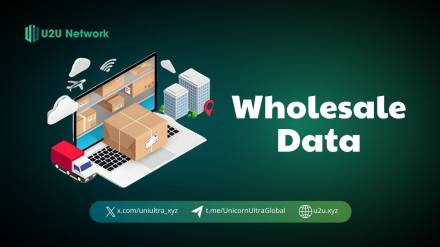Unlock the Power of Blockchain in Supply Chain Management: Revolutionize Your Operations with Unparalleled Transparency, Efficiency, and Trust. Discover how this transformative technology can streamline your supply chain, combat counterfeits, and enhance visibility - paving the way for a new era of supply chain excellence.
Table of Contents
Blockchain in supply chain management
Have you ever wondered what happens to the products you buy on their journey from the factory to your doorstep? The path a product takes through the supply chain is often complex and opaque, making it difficult to track and manage effectively. Traditional supply chain management methods rely on manual processes, paper trails, and multiple intermediaries, leading to issues like delays, errors, and lack of transparency. Blockchain in Supply Chain Management has the potential to revolutionize the way we manage supply chains by providing a secure, transparent, and efficient platform for tracking and managing supply chain activities.
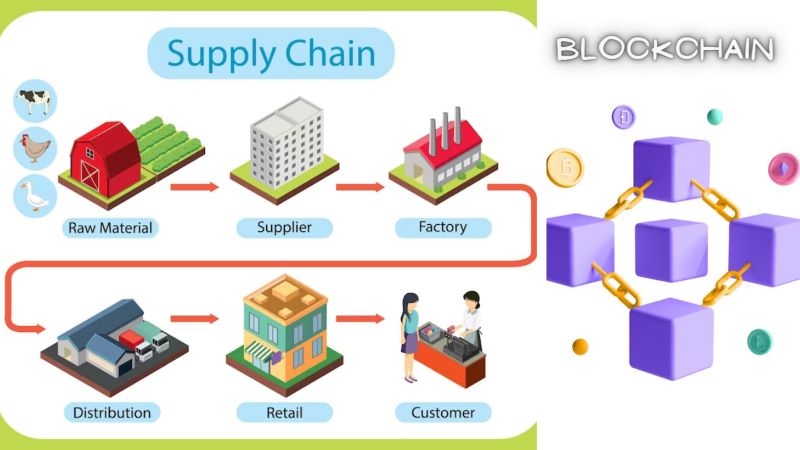
Blockchain is a decentralized, distributed digital ledger that records transactions across many computers in a network. This innovative technology provides a secure, transparent, and immutable way to track the movement of goods, ensuring the authenticity and origin of products.
Blockchain in supply chain management is the application of blockchain technology to streamline and secure the tracking and management of goods and information as they move through the supply chain. This innovative approach leverages blockchain's key features like decentralization, immutability, and transparency to address longstanding challenges in traditional supply chain management
The Pain Points of Traditional Supply Chain Management
Lack of Transparency
The search results highlight the lack of visibility and transparency as a major pain point in traditional supply chain management. Without real-time data and tracking capabilities, it becomes challenging to monitor the journey of products from the factory to the consumer, making it difficult to verify authenticity and ensure ethical sourcing practices. The siloed nature of supply chain data among various stakeholders further exacerbates this issue.
Counterfeiting and Fraud
The search results emphasize the prevalence of counterfeit goods and fraudulent activities in traditional supply chains, leading to significant financial losses and safety concerns for both businesses and consumers. The inability to reliably authenticate products at each stage of the supply chain leaves the door open for counterfeiters to infiltrate the system, undermining brand reputation and consumer trust.
Inefficiencies and High Costs
The search results indicate that traditional supply chain management, with its reliance on manual processes, paperwork, and multiple intermediaries, contributes to delays, errors, and increased costs.
The lack of efficient communication and coordination among supply chain partners, as well as the challenges in forecasting and inventory management, further exacerbate these inefficiencies
How Blockchain Transforms Supply Chain Management
Blockchain technology is revolutionizing supply chain management by providing enhanced traceability, counterfeit prevention, improved efficiency and cost reduction, and increased trust and accountability.
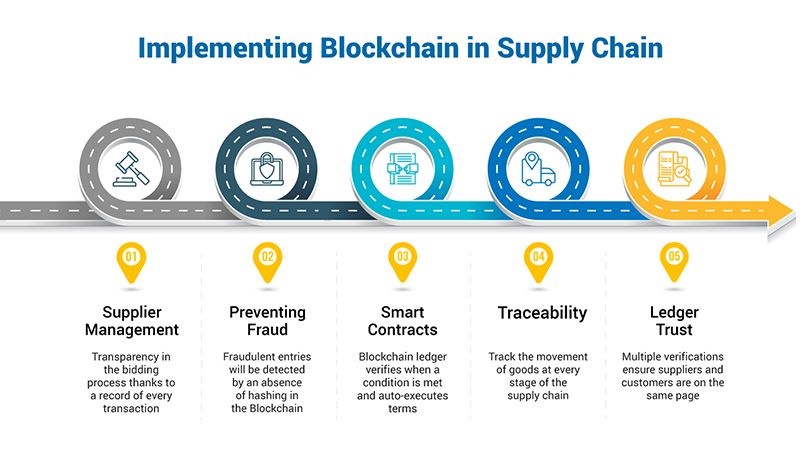
Enhanced Traceability
Blockchain creates an immutable record of a product's journey through the supply chain, from raw materials to the final consumer. Each transaction is recorded as a new block in the blockchain, providing a transparent and verifiable history of the product's movement. This enables end-to-end traceability, allowing companies and consumers to verify the authenticity and origin of products.
Counterfeit Prevention
The tamper-proof nature of blockchain makes it extremely difficult for counterfeiters to infiltrate the supply chain. Every transaction is recorded and validated by multiple parties, creating a secure and transparent record of a product's provenance. This makes it nearly impossible for counterfeit goods to be introduced into the supply chain without detection.
Improved Efficiency and Cost Reduction
Blockchain automates many supply chain processes, eliminating the need for intermediaries and reducing paperwork. Smart contracts can automatically execute transactions and trigger actions based on predefined conditions, streamlining processes and reducing errors. This leads to faster transactions, lower costs, and improved overall efficiency.
Increased Trust and Accountability
By providing a shared, verifiable ledger of all supply chain activities, blockchain fosters trust among stakeholders. All parties have access to the same information, promoting transparency and accountability. This helps to deter fraudulent activities and ensures that all participants are held responsible for their actions within the supply chain.
Real-World Examples of Blockchain in Supply Chain Management
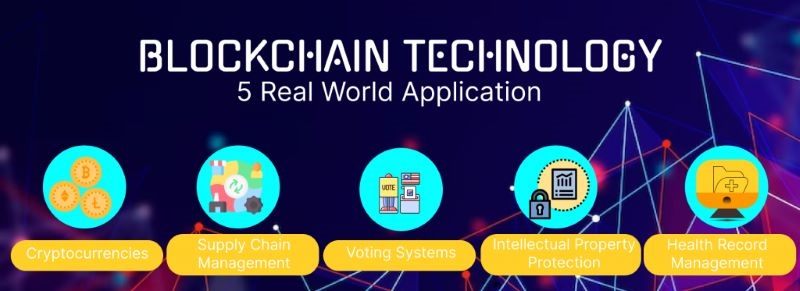
IBM Food Trust
IBM's blockchain platform is used to track food products from farm to table, ensuring safety and transparency. The platform uses blockchain technology to record and verify the origin, movement, and handling of food products, providing a secure and transparent record of the supply chain. This helps to ensure the safety and quality of food products, and also provides consumers with more information about the products they buy.
Walmart's Blockchain Initiative
Walmart is using blockchain to improve traceability and transparency in its food supply chain. The company has implemented a blockchain-based system to track the origin and movement of pork products from China, ensuring that the products are safe and authentic. This initiative aims to improve the transparency and efficiency of Walmart's supply chain, and also to provide consumers with more information about the products they buy.
Maersk TradeLens
Maersk TradeLens is a blockchain-based platform that aims to improve the efficiency and transparency of the shipping industry. The platform uses blockchain technology to track the movement of goods and containers, providing a secure and transparent record of the supply chain. This helps to reduce the risk of fraud and errors, and also provides shippers and logistics companies with more information about the status of their goods.
VeChain
VeChain is a blockchain-based platform that aims to improve the transparency and efficiency of the supply chain. The platform uses blockchain technology to track the movement of goods and products, providing a secure and transparent record of the supply chain. This helps to reduce the risk of fraud and errors, and also provides consumers with more information about the products they buy
Challenges and future prospects of blockchain in supply chain management
Scalability
One of the significant challenges in implementing blockchain technology in supply chain management is scalability. The massive data volumes generated by global supply chains pose a significant challenge to the scalability of blockchain technology. The current blockchain infrastructure is not designed to handle the massive data volumes, which can lead to performance issues and delays in transaction processing. To overcome this challenge, blockchain platforms need to be scaled up to handle the massive data volumes, which requires significant investments in infrastructure and resources.
Interoperability
Another significant challenge in implementing blockchain technology in supply chain management is interoperability. Different blockchain platforms have different protocols and standards, which can lead to compatibility issues and make it difficult to integrate different blockchain platforms. To overcome this challenge, standardized protocols and collaboration between different blockchain platforms are necessary. This requires significant efforts in standardization and collaboration among different stakeholders.
Adoption
The adoption of blockchain technology in supply chain management is another significant challenge. Convincing stakeholders to adopt blockchain technology requires significant education and awareness. The benefits of blockchain technology need to be clearly communicated to stakeholders, and they need to be educated on how blockchain technology can improve supply chain management. Additionally, the challenges and limitations of blockchain technology need to be addressed, and stakeholders need to be assured that the technology is secure and reliable.
Future Potential
Despite the challenges, the future potential of blockchain technology in supply chain management is significant. Blockchain technology has the potential to revolutionize supply chain management by enabling greater transparency, efficiency, and sustainability. Blockchain technology can provide real-time visibility into supply chain operations, enabling better decision-making and improved supply chain management. Additionally, blockchain technology can reduce costs and improve efficiency by automating transactions and reducing the need for intermediaries
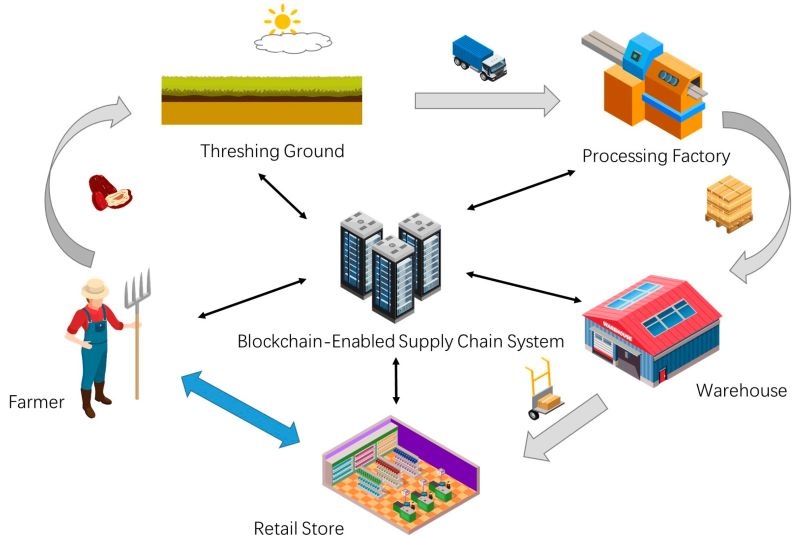
Blockchain is revolutionizing supply chain management, bringing unprecedented levels of transparency, traceability, and efficiency. U2U Network, as a decentralized social platform, embodies the fundamental principles of blockchain - transparency, trust, and community empowerment. While U2U is not directly involved in supply chain logistics, it fosters an environment aligned with the common goals of transparency and accountability in supply chains by utilizing blockchain to establish a transparent and trustworthy platform for its users.
The integration of blockchain into supply chain management is transforming industries by enabling real-time tracking, reducing fraud, and streamlining processes. U2U Network, with its focus on community building and information sharing, plays a role in raising awareness and promoting the adoption of blockchain-based solutions in supply chains. By facilitating open communication and collaboration, U2U helps bridge the gap between complex technologies and the practical needs of businesses and consumers.
As blockchain continues to reshape supply chains, platforms like U2U Network will become increasingly important in educating and connecting stakeholders across the entire supply chain ecosystem, contributing to a future that is more transparent, efficient, and decentralized in supply chain management.


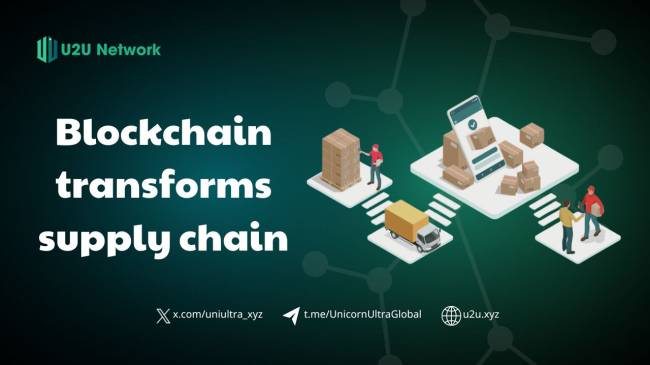
.png)

